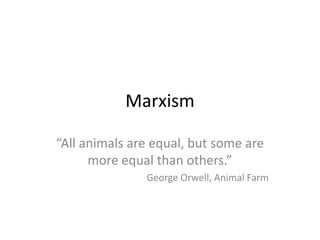
Marxism12[1]
- 1. Marxism “All animals are equal, but some are more equal than others.” George Orwell, Animal Farm
- 2. What is it? • Social and economic • Macro • Economic activities needed to provide for peoples material needs • Political/legal systems/social relations arise on the different type of economy • Superstructure with economy as base • As economy changes existing social organisation is inefficient
- 3. Society • Bourgeoisie and Proletariat • Underclass and middle class • Class struggle occurs because of the contradiction in classes (inefficiency), leads to revolution (oppression)
- 4. 3 types of Marxism • Classical • Orthodox Communism • Neo-Marxism
- 5. Classical • Outlines why Capitalist system will fail and why socialism will replace it • Economics is the driving force for everything • Way humans produce necessities controls all other aspects of life • Different ways of producing necessities defer to different societal structures
- 6. The Dialectic • Conflict between Thesis and Antithesis produces Synthesis which creates a new Thesis. • Will it spiral out of control?
- 7. Orthodox Communism • Only loosely based on Marxism • Soviet Union own spin on Communism • Based on politics not economics • Urban proletariat was small so couldn’t revolt, so communist rule became communist elite • Soviet style communism interpreted, shaped and developed by Lenin and Stalin -> ideologies in their own right.
- 8. Neo-Marxism • Emerged in western Europe • Didn’t believe in class struggle • Interplay between economics and political forces • Modern Marxists disliked Soviet Style of Marxism which they saw as authoritarian and oppressive • Commitment to personal autonomy and self- fulfilment in the form of liberation
- 9. Death of Marxism! • Student demonstrations in Tiananmen Square • Fall of Berlin Wall • Collapse of East-European communism • Collapse of communism = end of Marxism • “Marx’s ideas seem to have already been tried and to have failed. At one time, almost one-third of the world’s population lived under states inspired by the ideas of Marx” p.68, Sociological Theory, Ritzer and Goodman.
- 10. Death of Marxism? • “Now many of these formerly Marxist states have become capitalist, and even those that still claim to be Marxist are nothing but a highly bureaucratised form of capitalism.” p.68, Sociological Theory, Ritzer and Goodman. • Classical Marxism has 5 stages, with Capitalism leading to Communism, the above quote shows the opposite, that capitalism is to be strived for, not communism.
- 11. Death of Communism! • “Now many of these formerly Marxist states have become capitalist, and even those that still claim to be Marxist are nothing but a highly bureaucratised form of capitalism.” p.68, Sociological Theory, Ritzer and Goodman. • These former states weren’t Communist as Marx viewed it, but just regimes run in his name. They were run by a bureaucracy which was run by political ruling class not bourgeoisie. Workers were still exploited. • Leninism and Stalinism saw state ownership rather than collective ownership as Marx envisaged, the Governance was substantially different to Marx’s utopian vision.
- 12. Death of Communism? • Revolution predicted by Marx never occurred, it was “an occurrence of a non-event”. (Pip Jones, p48) • Capitalism today seems to be thriving, rather than becoming increasingly conflictive. • Economic globalisation has forced people to be/remain capitalist??
- 13. Mass Media • Class differences are still there but mass media blurs reality • We think there’s no need for revolt but there is • False sense of society portrayed by media • Mass media purely designed to divert us from reality • News distorted to focus on smaller/trivial not the oppression of people • Marx would say we need to be more self-aware and throw off shackles
- 14. Is it still relevant? • Yes! • 99%, 1%. • Still have an upper class and a lower class • We still have people selling their labour and not products • Riots -> lower class rising up • People still in poverty
- 15. Is it still relevant? • No! • No revolution • No socialist or communist economies • Marxism thought of as incomplete or out- dated • Rejection of idea that socialism only accomplished by through class conflict and revolution
- 16. Be afraid…be very afraid! • “The Communists disdain to conceal their views and aims. They openly declare that their ends can be attained only by the forcible overthrow of all social conditions. Let the ruling classes tremble at a Communistic revolution. The proletarians have nothing to lose but their chains, They have a world to win. Working men of all countries, unite!” • Marx & Engels, The Communistic Manifesto, p74
- 18. Bibliography • Rob Stones; 1988; Key Sociological Thinkers • George Ritzer & Douglas Goodman; 2003; Sociological Theory • Pip Jones; 2003; Introducing Social Theory • Karl Marx & Frederick Engels; 1971; Manifesto of the Communist Party • Monty Python, excerpt from the Holy Grail, 1974 • http://www.listal.com/viewimage/1857824h